Doctor Who Primer — Part One
By Christopher Brosnahan
The Twilight Zone? Quantum Leap? Babylon 5? Any of the Star Treks? V? Buffy? Angel?
Pshaw. Pshaw, I say.
As any good British man knows (queue suitably pompous music), the best science fiction series of all time remains the original science fiction series. Specifically, Doctor Who. This was a popular science fiction series which predates the original Star Trek by three years. It debuted on the BBC on the 23rd of November, 1963 — the day before Kennedy was assassinated — and ran until 1989, when it was cancelled, in a bizarre choice by the BBC. Cancelled, that is, until recently.
But I'm getting ahead of myself.
The first thing to realise about Doctor Who is... no, let's not even go that far. It's not 'Doctor Who'. That's not his name. We don't know his name. We have never been told his name. All we know him as is 'The Doctor'. The title is a line from the first episode — "Doctor? Doctor who?" — but it's a common misconception to see it as the characters name. The first thing to realise about The Doctor is that he is an alien. Specifically, a Gallifreyan, also known as Time Lords. The Time Lords have the ability, as you would expect from the name, to travel through time. (And space, as well, but we don't put that part into the name, otherwise the species name would just get unwieldy.)
Time Lords don't travel through time and space by themselves, of course. They use machines they call TARDIS: Time and Relative Dimensions in Space. Basically, it's a huge spaceship which is capable of space / time travel, but it's enclosed within a separate dimension; which is separate from what we will refer to as the 'Outer Shell'. The Outer Shell being what we see when we look at it from the outside; however, the machine has a cloaking device, which is programmed to make it into something inconspicuous, as well as hiding it's mass. Unfortunately for the Doctor, in the very first episode, the cloaking device failed, and it has remained a nineteen sixties style Police Box. (Police Boxes used to contain phones with a direct line to the local station.) So ever since then, it has been a Police Box, which just happens to be larger on the inside. As everybody points out. In fact, by the third Doctor, we got the following exchange:
Brigadier: ...
Doctor: Aren't you going to say something?
Brigadier: Well, I was going to remark on the fact that it's bigger on the inside, then I realized that everybody probably says that.
The TARDIS that the Doctor owns doesn't work very well. He can't steer it properly, or often, and usually travels with an attitude of "Wherever I end up is where I'm meant to be." Why does he do this? Simple. He's an outlaw. Similar to the Watchers from Marvel Comics and long before the Prime Directive in Star Trek, the Time Lords had taken a vow of non-interference. No matter what happened, the Time Lords would passively observe. The Doctor, however, couldn't bear watching people get hurt or watching the bad guys win, and so rebelled against the Time Lords, stole a TARDIS and went on the run. Unfortunately for The Doctor, the TARDIS he stole was one that was waiting to be repaired.
Occasionally, we have had hints that the TARDIS is somewhat more than a machine — The Doctor has been known to talk to it occasionally, and there is an idea that it is somewhat sentient. One time, when it broke down, The Doctor fixed it by cleaning it — "The Tardis is more than a machine, Tegan... it needs coaxing, persuading, encouraging." — and it has been known to be even more erratic than normal if one of The Doctor's enemies tries to control it. So, somewhat unreliably, the TARDIS takes the doctor through time and space, frequently breaking down, and always stuck in the shape of a blue Police Box, which The Doctor has become somewhat fond of.
So, that covers where he comes from and how he travels around. So, how about The Doctor himself? Well, here are the basics... he is roughly a nine hundred and something year old being (he's vague about his actual age), has two hearts (as do all Gallifreyans) and he regenerates when he dies. When he regenerates, he regenerates into a completely new body with a relatively new personality. This was first done in 1969, three years after the first Doctor started. The Doctor can regenerate thirteen times in total (he's up to his ninth, as of the new series) — the same as all other Time Lords. Now, the cynic may point out that this is just a convenient way to stop the series from getting stale... and the cynic would probably be right. There's no quick way to do this — so I'm going to go through the Doctors.
01 — William Hartnell [1963-1966]
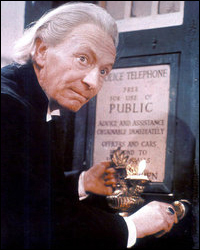 Hartnell was an older, white haired man — and somewhat grouchy as well. In fact, the first Doctor is generally remembered as a bad tempered git, who had a heart of gold once he softened. It is important to realize that, in the early days of the series, the viewers had no idea who the Doctor was. Whether he was an alien or a human or what... all they knew is that he was from the future, at the very least.
Hartnell was an older, white haired man — and somewhat grouchy as well. In fact, the first Doctor is generally remembered as a bad tempered git, who had a heart of gold once he softened. It is important to realize that, in the early days of the series, the viewers had no idea who the Doctor was. Whether he was an alien or a human or what... all they knew is that he was from the future, at the very least.
Hartnell's Doctor was introduced along with his 'granddaughter' Susan (granddaughter is in quotations since it was revealed later that Time Lords are not born, and do not procreate in the normal way, so it is unlikely that they were related). He then half-kidnapped two of Susan's teachers, and went travelling. Now, originally, the series was meant to be half educational, and the edict was passed down from on high that there would be no 'Bug Eyed Monsters'. Unfortunately for on high, they allowed the story "The Daleks" fairly early on, who immediately became the most popular BEMs in history — about whom more later.
The crabby, bad tempered git eventually softened, and fans slowly began to grow to love him. The show, meanwhile, was like nothing else that had ever been aired on television before (anywhere), and was a huge hit. Susan's teachers became friends, and rather than being stowaways / kidnap victims, they became companions... setting the stage for a huge succession of them. (From here on in, The Doctor has been without a companion for a total of one story.)
The best moment, by far, of Hartnell's Doctor were the lines he gave to Susan when he left her behind. She was under the impression that she needed to stay with The Doctor to take care of him, whereas he was aware that he was holding her back, and she didn't need him any more. With her in tears outside the TARDIS, he gave the following lines, which I have no shame in saying are still capable of bringing a lump to my throat.
"Someday... I shall come back. Yes, someday. And until that time, let there be no tears... no cries, no anxieties. Just go forward in all your beliefs... and prove to me that I am not mistaken in mine."
The Doctor eventually said goodbye to the rest of his companions, and gained a bunch of new ones. Unfortunately, Hartnell's health was becoming an issue, and so, against his wishes, he was replaced. The Doctor grew ill and weak and eventually, after battling the Cybermen (about whom, also, more later), The Doctor died.
But his body started to change...
02 — Patrick Troughton [1966-1969]
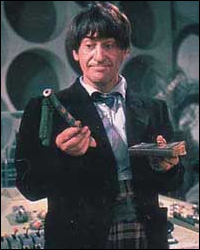 Troughton really couldn't have been much more different from Hartnell. To most readers today, Troughton would be a lot better known as the slightly mad Irish priest from The Omen (the one who gets impaled on a church spire). To me, he will always be the second Doctor.
Troughton really couldn't have been much more different from Hartnell. To most readers today, Troughton would be a lot better known as the slightly mad Irish priest from The Omen (the one who gets impaled on a church spire). To me, he will always be the second Doctor.
Whereas Hartnell had a slightly haughty, nearly regal sense of authority, Troughton was more of a mischievous imp. Much funnier than his predecessor, the new Doctor brought in a new group of fans and appealed more to children. However, this didn't mean that, to his enemies, he wasn't dangerous. Far from it. This Doctor was aware that his greatest weapon was underestimation, and so, like Lear's Fool, he encouraged his foes to let him get away with audacious plans where others would fail.
Over time, his character changed slightly, and he became a little more serious — however, the image of him as the mischievous imp does retain. Personally, I was never a huge fan of Troughton's Doctor. I don't know why, but he just never clicked for me. Nonetheless, at the time, the series went from strength to strength, gaining viewers, and Troughton became a huge star.
Now, whether at this point the BBC was losing some of its budget or whether — more likely — it just felt that it had to ground the show somewhat, we may never know. But we do know what happened in the series. The Doctor was summoned to his home planet, Gallifrey, where he was put on trial for his crimes. He was forced to regenerate, and his ability to travel through time was erased from his memory, as was — crucially — his ability to travel through space. The series was about to stay purely on Earth. Yes, a show about time and space was about to be confined to one time and one space.
While this sounds like it should have castrated the show, instead, it did the opposite. It brought it to even greater heights.
03 — Jon Pertwee [1970-1974]
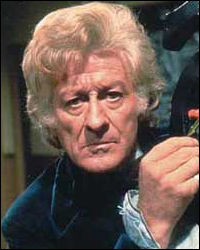 Jon Pertwee is probably better known in the states as the actor that played the lead role in Wurzil Gummidge... but then again, maybe not. Jon was older than Troughton, but was younger than Hartnell, and occupied the kindly uncle kind of character. He launched himself totally into the part, and was able to make an Earthbound Doctor interesting.
Jon Pertwee is probably better known in the states as the actor that played the lead role in Wurzil Gummidge... but then again, maybe not. Jon was older than Troughton, but was younger than Hartnell, and occupied the kindly uncle kind of character. He launched himself totally into the part, and was able to make an Earthbound Doctor interesting.
In fairness, The Doctor did have backup from UNIT (United Nations Intelligence Taskforce), who brought a more military feel to the series. Considering that the Doctor was trapped in one time and space, it was fortunate that so many monsters happened to congregate there on such a regular basis. Admittedly, this may have had something to do with the arrival of The Doctor's arch-nemesis, The Master, who was a rival Time Lord given a similar punishment to The Doctor. Luckily, The Master being around gave the series its first fixed villain.
UNIT had been introduced briefly during Troughton's run, and the new style worked surprisingly well. While The Doctor himself was still his usual eccentric self, he was now surrounded by straight men for him to bounce off, which gave the series a great feel generally.
Eventually, after being briefly reunited with the first and second Doctors (via a rather fun, but totally contrived story to coincide with the series' tenth anniversary), and defeating the villain Omega (as a favour to the Time Lords), The Doctor's memories were restored and he was free to travel time and space again.
At which point he promptly ran into a bunch of giant evil spiders and got himself killed again. Rather careless, really. Still, as popular as Pertwee remains (and he is popular, partially due to the fact that he loved the fans and revelled in what he did), he was about to be overshadowed by the man who is, to most, The Doctor.
04 — Tom Baker [1974-1981]
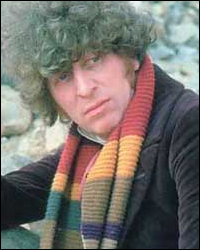 Tom Baker is the image most people have of The Doctor — hell, he's even turned up in The Simpsons. A shock of uncontrollable hair, a large, toothy grin, and the world's longest scarf. Not to mention a voice which is second in boominess to Brian Blessed only. He was joined, for a long time by a mechanical dog called K-9, primarily as a response to Star Wars. It didn't hurt that K-9 was somewhat marketable as well.
Tom Baker is the image most people have of The Doctor — hell, he's even turned up in The Simpsons. A shock of uncontrollable hair, a large, toothy grin, and the world's longest scarf. Not to mention a voice which is second in boominess to Brian Blessed only. He was joined, for a long time by a mechanical dog called K-9, primarily as a response to Star Wars. It didn't hurt that K-9 was somewhat marketable as well.
Not that K-9 was the most important companion. No, not any of his human companions either. The Doctor's most important companion during these years was the chief writer at the time... Douglas Adams. Yes, Douglas Hitchhikers Guide to the Galaxy Adams. Since the series was undoubtedly somewhat ridiculous by this point, Adams managed to make it even more tongue in cheek, which suited Baker's delivery perfectly.
For years, there was a perfect synergy between actor and writer, and this is generally looked back on as the high point for Who. It was certainly the most popular time. It was also very high quality as well... the tongue wasn't in cheek permanently. Occasionally, it was displaced, as Baker was given some meaty issues to get his teeth into.
The high point of the melodrama of these years is undoubtedly "The Genesis of The Daleks". This was a tale whereby The Doctor was given the chance to go back in time and kill The Daleks (about who, again, more later) as they were being created.
The Doctor had placed bombs throughout the laboratory in which they were created, and as he held the two wires that needed to be touched together to set the explosives off... he hesitated. What gives him the right? Yes, The Daleks are undoubtedly evil... but their evil leads to good people joining together against them. And can he bring himself to kill? One way or the other, he was in a position to kill a defensive enemy. And he just couldn't bring himself to do it.
And that's what appeals so much about the character. You may never know everything about him, and he may be operating under a different set of rules, but he is resolutely moral and pacifist.
And other times, he just had a huge cheesy grin. Baker could carry just about any story off, despite budgets, special effects — it didn't matter. He totally carried the series for a while.
This combination of character perfection, ideal casting and great writing led Baker's Doctor to be, by far and away, the most popular Doctor so far — as well as the longest running. After years of success, The Doctor was murdered by The Master (yes, him again, having regenerated as well). He was barely saved, and only just managed to regenerate.
05 — Peter Davison [1981-1984]
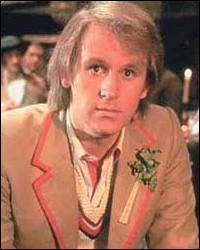 Some wags may point out that The Doctor having only just regenerated is what led to Peter Davison's Doctor being quite so drippy. And they may have a point. Peter Davison was, at the time, a sort of young Hugh Grant (and at 29, remains the youngest Doctor there has been).
Some wags may point out that The Doctor having only just regenerated is what led to Peter Davison's Doctor being quite so drippy. And they may have a point. Peter Davison was, at the time, a sort of young Hugh Grant (and at 29, remains the youngest Doctor there has been).
It just seemed strange having a young pretty-boy as The Doctor... however, Davison certainly won me and quite a number of other fans over, partly due to the fact that the humour was slightly toned down during his tenure as the Time Lord. The scripts became a tad more mature, and the stories became a touch more serious science fiction. It was during Davisons reign that Mary Whitehouse (infamous crazy old censoring biddy in charge of an interest group) started her campaign to have Dr. Who banned from television. Davison's Doctor wasn't as over the top as Tom Bakers, and wasn't as popular, but he was quite possibly the most solid Doctor there's been.
One minor issue I had with Davisons reign is that, for the first time, The Doctor didn't so much have a style of dressing as a uniform. He wore pretty much the same clothes for the entire series (sort of a cricket outfit), and also had a piece of celery on his lapel. The celery was at least explained in his last episode — it was to detect a certain kind of poison. However, it made The Doctor seem a lot less like a fully dimensional character, and a lot more like a comic book character. It just seemed... slightly incongruous.
Typically of the mature style of the series, Davison's Doctor was poisoned and died slowly... sacrificing himself so that his companion could have the antidote.

